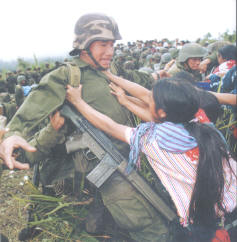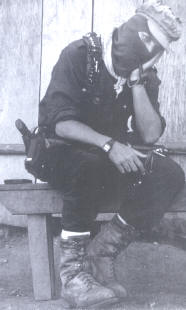
ZAPATISTA TIMELINE
BEFORE THE ZAPATISTAS ...
BACKGROUND: In 1524-27 Spaniards conquer the Mayan people—who had lived since the start of history in and around what is now called Chiapas, Mexico. By the late 1500s the Mayan population is cut in half through disease and repression. Centuries of virtual slavery at the hands of local elites, international "traders," and dictators are challenged in the 1910-1920 Mexican Revolution, with Emiliano Zapata and Pancho Villa among the war heroes. But in 1928 the Institutional Revolutionary Party (PRI) begins its 71-year hold on power through force and fraud.
From 1940-1970, as cattle ranchers press for land from a booming indigenous population, over 100,000 indigenous people are forced to migrate into the Lacandon Jungle of Chiapas. Over 50,000 more Indians are forced into large cities or the Lacandon Jungle for resisting local power structures, in the decade following the 1968 massacre of hundreds of protesting students in Mexico City. In 1982, the new governor of Chiapas dramatically increases the militarization to control land struggles—overrunning 54 communities and evicting, imprisoning, and killing hundreds.
MARCOS: We are a product of five hundred years of struggle: first, led by insurgents against slavery during the War of Independence with Spain; then to avoid being absorbed by North American imperialism; then to proclaim our constitution and expel the French empire from our soil; later when the people rebelled against Porfirio Diaz’s dictatorship, which denied us the just application of the reform laws, and leaders like Villa and ZapataI emerged, poor men just like us who have been denied the most elemental preparation so they can use us as cannon fodder and pillage the wealth of our country. They don’t care that we have nothing, absolutely nothing, not even a roof over our heads, no land, no work, no health care, no food or education, not the right to freely and democratically elect our political representatives, nor independence from foreigners. There is no peace or justice for ourselves and our children. But today we say: ENOUGH IS ENOUGH!
A DECADE OF ORGANIZING ...
BACKGROUND: In 1983 Marcos and other activists arrive in Chiapas to create a guerrilla force. The Zapatista National Liberation Army (EZLN) is born on November 17 with three indigenous and three mestizos. Three years later, the EZLN enters its first indigenous community at the invitation of local leaders, and the EZLN learn as much about democratic communal decision making as they teach about armed self-defense. Three years after that, the EZLN has grown to over 1,300 armed members. The political arena is no alternative--in 1988 the populist opposition presidential candidate Cuauhtemoc Cárdenas is ahead when vote-counting computers suddenly "crash" and the PRI candidate, Carlos Salinas, is declared the winner. In 1992 Salinas "reforms" Article 27 of the Mexican Constitution, ending all hopes for land reform and facilitating privatization of ejidos (land held collectively by the indigenous—hard won by revolutionaries such as Zapata and Villa). The next year, Zapatista communities approve a military offensive by the EZLN and appoint the group of "commandantes" and "subcommandantes" to lead the struggle.
MARCOS: This revolution will not end in a new class, faction of a class, or group in power. It will end in a free and democratic space for political struggle born above the fetid cadaver of the state-party system and the tradition of fixed presidential successions. … In this new political relationship, different political proposals (socialism, capitalism, social democracy, liberalism, Christian democracy, and so on) will have to convince a majority of the nation that their proposal is the best for the country. The groups in power will be watched by the people in such a way that they will be obligated to give a regular accounting of themselves, and the people will be able to decide whether they remain in power or not. The plebiscite is a regulated form of confrontation among the nation, political parties, and power, and it merits a place in the highest law of the country.
1994 ARMED UPRISING ...
BACKGROUND: NAFTA is implemented on January 1, and that day 3,000 armed EZLN members occupy six large towns and hundreds of ranches. By the next day the Mexican army responds, bombing indigenous communities and killing at least 145 indigenous people. Mexicans nationwide demonstrate for an end to military repression, and a cease-fire is declared on January 12.
MARCOS: At dawn on the fifteenth we were going to drink our urine. … We decided to take a sip, all at the same time, to see what would happen. I don’t know who began the "concert," but almost immediately we all began to vomit what we had ingested, and also what we hadn’t. We were left even more dehydrated, prostrate on the ground, like dunces, stinking of urine. … Hours before sun up, a sudden rain washed over us, alleviating our thirst … we reached the outskirts of a small village. Camilo went to ask for something to eat. He returned with a little fried pork, hard and cold. … In a few minutes the cramps began. The diarrhea was memorable. We were strewn at the foot of a small wooded hill. A federal troops patrol passed us by a mere 500 meters away. They didn’t find us because God is grand. The smell of shit and urine could be smelled kilometers away.
MARCOS: Capitán Insurgente Laura is a Tzotzil woman. Fierce in battle and fiercely committed to learning and teaching, Laura becomes the captain of a unit composed only of men, all novices. … No one carries as much or walks as far as she does. She carries in her hands a carbine that she has taken from a policeman, he who only saw someone to humiliate or rape as he gazed upon her, an indigenous woman. After surrendering, the policeman ran away in his shorts, the same one who until that day believed that women were only useful when pregnant or in the kitchen . . .
1995 U.S.-PAID VIOLENCE
BACKGROUND: The Mexican peso loses more than half its value. The U.S. and the International Monetary Fund bail out rich speculators with $50 billion, but that does not reverse plummeting employment and living standards for workers. Chase Manhattan Bank issues a report calling for the Mexican government to "eliminate the Zapatistas"—which by now consist of dozens of communities and over 50,000 civilians. On February 9, the army massively invades Zapatista areas of influence, eventually bringing over 60,000 troops to Chiapas, displacing 20,000 campesinos and disrupting Indigenous life. In August the Zapatistas hold the first international consulta. Over 1,000,000 people vote, calling on the EZLN to transform into a new independent political force.
MARCOS: Neoliberalism [corporate globalism] versus Zapatismo. Why do they fear us? Why so much hate for so few and so small a group? because we have defied them, and the worst part of defiance is that it establishes a precedent.
’96 "AGREEMENT" ...
BACKGROUND: In February the EZLN and the government sign the San Andres Accords, outlining a program of land reform, indigenous autonomy, and cultural rights. Talks on democracy and justice fail by August, as government representatives refuse to discuss Zapatista proposals and present nothing substantial of their own. The year ends with Zedillo formally rejecting the San Andres Accords.
MARCOS: We are poor because that is what we have chosen. … If we had surrendered, if we had sold ourselves, we would now have good houses, good schools, hospitals, machinery for working the land, better prices for our products, good food. We chose not to sell ourselves, we chose not to surrender. … We, the Zapatistas, are fighting for good homes, good food, good health, a good price for our work, good lands, good education, respect for the culture, the right to information, liberty, independence, justice, democracy, and peace. Yes, we are fighting for all of that, but for everyone, not just for ourselves. … If we had surrendered, if we had sold ourselves, we would no longer have been poor, but others would have continued to be so. … "Everything for everyone," say our dead. "Until this is true, there will be nothing for us."
’97 ACTEAL MASSACRE ...
BACKGROUND: On September 12, Zapatistas arrive in Mexico City for the founding of the unarmed Zapatista National Liberation Front (FZLN), the civil political arm of the indigenous movement. But back in Chaipas on December 22, a paramilitary (death squad) group affiliated with the PRI attacks a church in Acteal, killing 45 Indigenous campesinos, mostly women and children. Zedillo sends in the army to disarm the Zapatistas but not the paramilitaries, who he denies exist in Chiapas.
MARCOS:
Behind our black mask,
Behind our armed voice,
Behind our unnameable name,
Behind us, who you see,
Behind us, we are you.
Behind us, you are us.
Behind our masks is the face of all excluded women,
Of all the forgotten individuals,
Of all the persecuted homosexuals,
Of all the despised youth,
Of all the beaten migrants,
Of all those imprisoned for their words and thoughts,
Of all the humiliated workers,
Of all those dead from neglect,
Of all the simple and ordinary men and women,
Who don’t count,
Who aren’t seen,
Who are nameless,
Who have no tomorrow.
’98 DISMANTLING ...
BACKGROUND: When foreign human-rights observers reveal the truth to the world, in February Zedillo starts to expel what becomes over 150 of them. In April the army begins violently to invade and dismantle autonomous Zapatista communities. After more massacres the resulting outcry from civil society puts a temporary halt to the army’s offensive.
MARCOS: The globalization of markets erases borders for speculation and crime and multiplies them for human beings. Countries are obliged to erase their national borders for money to circulate, but to multiply their internal borders. Neoliberalism doesn’t turn many countries into one country; it turns one country into many countries.
’99 THE PEOPLE SPEAK ...
BACKGROUND: In March over 5,000 civilian Zapatistas conduct a week-long program of popular education throughout the country. The Zapatistas organize a Consulta on Indigenous Rights and Culture on March 21, and over 3 million Mexicans vote at thousands of polling places, agreeing that the San Andres Accords should be implemented. When state police occupy the autonomous community of San Andres in April, the next day 3,000 unarmed Zapatistas nonviolently force them to leave the town. Meanwhile, in the face of numerous nonviolent protests, by August military paratroopers and forces occupy the final remote village they want in order to build a road that will encircle the Zapatistas in the Lacandon Jungle.
MARCOS: The helicopters above, and the chac-chac-chac-chac of the blades are all around us, and I remember that chac in Tzotzil means "ass," and from the "ass-ass-ass" of the helicopters I return to my notebook.
’00-’01 A SLY FOX ...
BACKGROUND: On July 2, 2000, Vincente Fox of the conservative PAN party is elected president, rupturing seventy-one years of PRI control. He immediately pushes for legislation that makes a show of honoring the San Andres accords, but all the concessions to autonomy are hedged by allusions to overriding Mexican federal law. This is not why the Zapatistas resolved to take up arms, and it is not why they agreed to lay them down. Their February 2001 caravan to Mexico City demonstrates enormous public support.

Keep up with the Zapatistas ...
Get involved by contacting
Mexico Solidarity Network,
www.mexicosolidarity.org
or locally,
The ICPJ Religious Coalition on Latin America
734-663-1870, www.umich.edu/~canter/icpj,
icpj@umich.edu
(you don’t have to be religious, just coalescent)
Ask your bookseller for these books on the Zapatista Movement:
Our Word Is Our Weapon
by Subcomandante Insurgente Marcos
The Story of Colors
by Subcomandante Marcos, with indigenous illustrations
Questions & Swords
by Subcomandante Marcos, with indigenous illustrations
The War Against Oblivion
by John Ross
Signed Elements ©
Individual Authors
Unsigned Elements © Agenda Publications, LLC